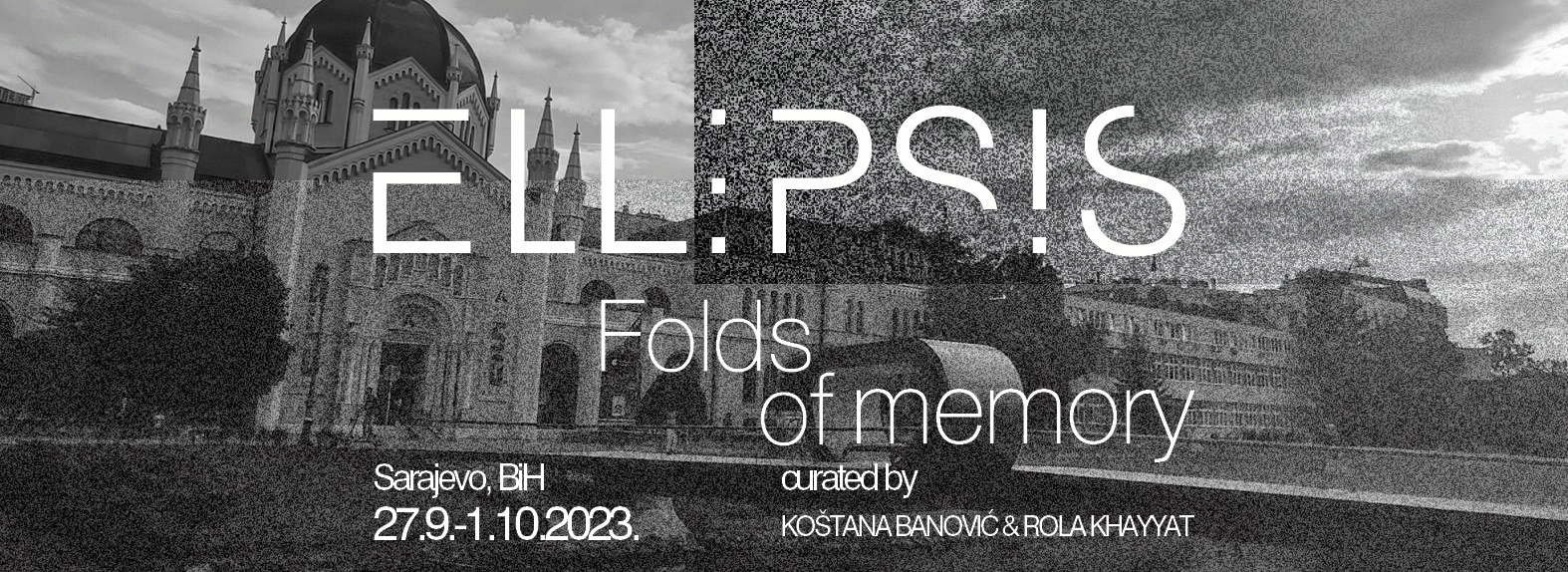Join us for ellipsis, folds of memory, five days of screenings, artist talks, workshops, lecture performances, a pop-up show, walks and talks with artists, filmmakers, and scholars from the Middle East and the Balkans, converging in Sarajevo:Sept 27 – Oct 1. The participants employ different storytelling techniques, and multidisciplinary practices to articulate hidden narratives and activate untapped stories within spaces of aftermath. Taken together they imbricate creative possibilities in rethinking our past, present and future realities by subverting the singularity of the narrative, and the archive.
The program is structured around three thematic modules; the first journeying through ships and the sea, the second ruminating on ruins and ruination, and the third activating personal narratives. Moving between material and metaphorical objects, ellipsis, folds of memory investigates what produces them, what defines them, and how they impact individuals and cities on levels from the visual and formal to the political and literary.
Module 1: Ships and the Sea
Seas are inextricably linked to histories, cultures, bodily memory, and pressing contemporary issues. Anthropologist Nikolas Kosmatopoulos will draw on years of active involvement in sea-centered movements of solidarity in the Mediterranean, including efforts to challenge the embargo in Gaza and to support border-crossing refugees. Can indigenous-led practices that engage contemporary oceans be rethought in ways that relate directly to the politics of radical social change and, in particular, the question of anticolonialism today? Alternatively, can artistic practices provide voice, and form to these watery bodies through more fluvial and less linear narratives? In 1992, waves of refugees from the war in Bosnia and Herzegovina, were granted accommodation on ships, temporary homes for people waiting for decisions on their asylum applications. Veteran ship residents, Filmmakers Adnan Softic and Vladimir Tomic, reflect on this particular experience of (home)land and sea. In Softic’s multimedia film, Bibby Challenge, life on an accommodation ship off the coast of Hamburg is examined in relation to the motif of refugees on the water and their search for solid ground. While Tomic’s film Flotel Europa, is a tale of coming of age on a similar ship off the coast of Denmark juxtaposed with personal VHS archive material shot by refugees who shared the “space-time vacuum” of the Flotel. This space-time vacuum is expanded upon in Filmmaker Stefan Pavlovic’s lyrical film Looking for Horses, about his friendship with a fisherman and war veteran, where water/lake and the boat are the means to keep soundness of mind, with a healing power. Artist and filmmaker Temra Pavolovic deconstructs the image of the ship into parts, in her lecture performance The Seams, asking how an image can undo itself, and taking us into the inner workings of the mind, the mechanisms of narrative and the mechanics of memory as a multidimensional encounter.
Module 2: Ruins and Ruination
How can ‘folklore’ become a common emancipatory tool for people to overturn dominant discourses, reclaim their history and land and rewrite reality as we know it? In a screening and discussion on ‘our songs were ready for all wars to come’, artist Noor Abed will explore the critical stance of ‘folklore’ as a source of knowledge and its possible connection to alternative social and representational models in Palestine. In a similar vein, artist Aida Šehović and author Yasmine Khayyat will gather participants around the ritual of sharing coffee, dominant in both of their cultures. They will use drawing, reading and writing to investigate the wiles of memory as it waxes and wanes in tandem with the violence that engulfed Bosnia and Herzegovina (1992-1995) and Beirut (1975-1990). How does the ecological converge with the political in the formation of borders and boundaries? This question will be scaled in creative ways; artist Milos Trakilovic will address the poetic dimensions of mountains in a performative lecture, in the relation to being and belonging, and current conceptions of migration, cohabitation and coexistence. Danjiela Duganovic will lead us on a walk up a mountain, where we will explore the complex narrative woven around Memorial Park Vraca, a place that encapsulates the transformation of memory, echoes the heroic deeds inscribed in Sarajevo’s history and spotlights the figure of a hero.
Module 3: Personal Narratives
What forms of knowledge are being produced in the moment that art interacts with archives and how do we articulate the substance of these forms? Photographers Roi Saade and Tamara Abdul Hadi will address this question by engaging the public in a zine making workshop utilizing archival images sourced from the participants’ own family archive or a series of photographic images re-imagining a narrative or memory. Kemil Bektesi will delve into the profound questions surrounding the working class and society’s labor force through the ruminative gesture of his father’s profession of baking bread, and in particular Bosnian pie-making. Adela Jusic will reflect on the material and immaterial modalities of memory’s function as an alternative archive against the more intangible and yet decomposing tangibility of photographs.
ellipsis, folds of memory is organized by curators Rola Khayyat and Kostana Banovic in partnership with Historical Museum of Bosnia and Herzegovina, Manifesto Gallery, Kuma International, VII academy, Atelje Figure, artTrace Foundation and Kamen Foundation.
This project is made possible with the generous support of VCUarts.
All events are free and will take place in various venues around Sarajevo.
